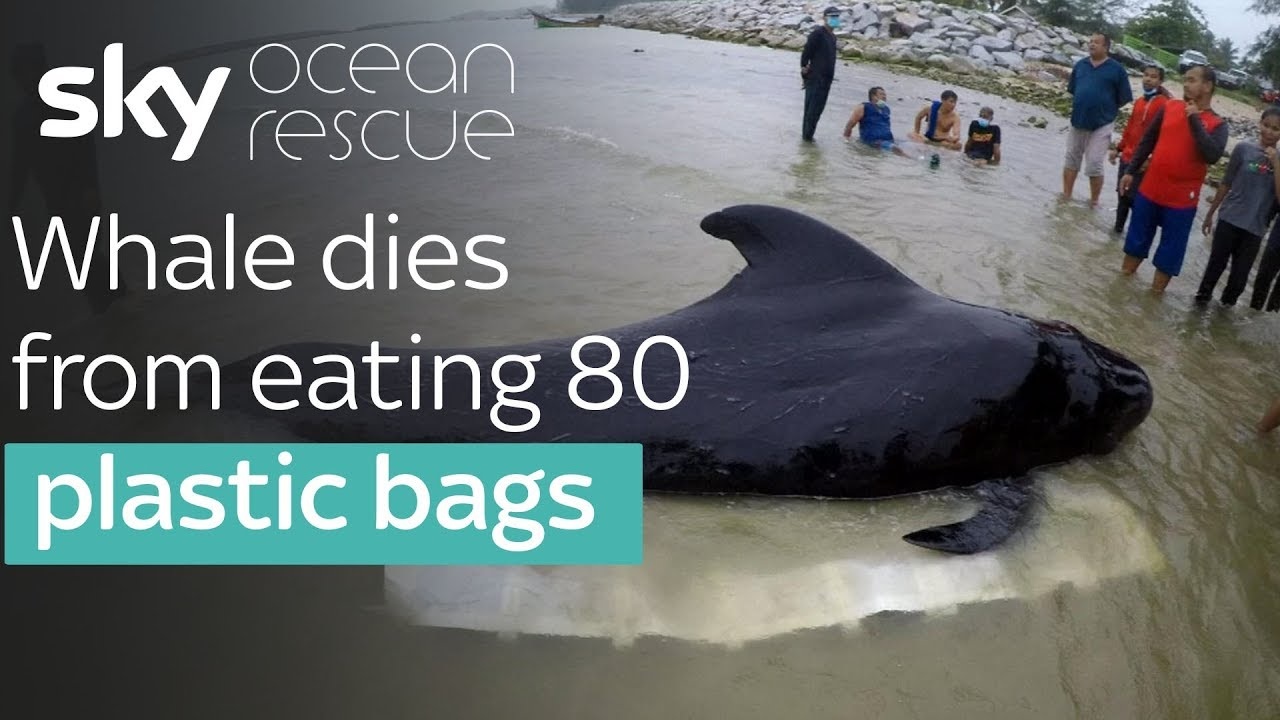

A pilot
whale died in southern Thailand last week after swallowing 17 pounds of plastic waste, despite a five-day effort to save the animal’s life.
A necropsy revealed that the plastic debris, which included 80
plastic bags, clogged the whale’s stomach, Reuters reported.
The whale was found in critical condition in a canal near Thailand’s border with Malaysia on May 28. Photos posted on Thai Whales’
Facebook page show a group of people tending to the whale and trying to keep it afloat.
According to Thailand’s Department of Marine and Coastal Resources, the whale vomited five plastic bags on Friday and eventually died that afternoon.
“This plastic rubbish made the whale sick and unable to hunt for food,” the department said on its website.
Grisly photos on the marine department’s Facebook page show dozens of black plastic bags exhumed from the whale.
“Ask your heart to see if you’re still going to dump the trash,” the post stated.
[facebook https://www.facebook.com/DMCRTH/posts/1667800893267401 expand=1]
Jatuporn Buruspat, head of the department, told Reuters the whale probably mistook the floating plastic bags for food.
Around the world, an estimated
8 million metric tons of plastic waste gets dumped in our oceans every year. A 2015 study found that 60 percent of the world’s plastic waste comes from just five countries: China, Indonesia, the Philippines, Thailand and Vietnam.
Thon Thamrongnawasawat, a marine biologist and lecturer at Kasetsart University, told
AFP that about 300 marine animals including pilot whales, sea turtles and dolphins die each year in Thailand after ingesting plastic.
“It’s a huge problem,” he said. “We use a lot of plastic.”
“If you have 80 plastic bags in your stomach, you die,” Thamrongnawasawat added.
The pilot whale’s death is another grim reminder of the harmful impact of ocean pollution. In April, a 6-ton, 33-foot-long juvenile sperm whale was found dead in southern Spain. A necropsy reveled it ingested 64 pounds of mostly plastic garbage.
Folks around the world expressed sadness about the latest man-made tragedy.
? Despite efforts to save him, this pilot whale in Thailand died after ingesting 80 plastic bags.
How many more stories like this do we have to see? https://t.co/ai5RF5YVR0 pic.twitter.com/1yIJuJ3lNw
— Greenpeace (@Greenpeace) June 4, 2018
“Many in the region and around the world are extremely concerned about such incidents,” Suresh Valiyaveettil, an expert in polymer chemistry at the National University of Singapore, told the
New York Times in an email. “Considering the amount of plastic in the ocean, unfortunately, such incidents are going to be more common in the near future.”
Tomorrow will mark the United Nations’ World Environment Day, which centers around the theme of
beating plastic pollution.
On Monday in Vietnam, 41 embassies and international organizations signed a Code of Conduct on Combating Plastic Pollution.
According to
Vietnam News, signatories include Austria, Belgium, Canada, Denmark, the European Union, Finland, France, Germany, Ireland, Italy, the Netherlands, New Zealand, Norway, Slovakia, Sri Lanka, Sweden, Switzerland, the UK and the U.S. as well as 16 UN agencies, funds, program, offices and the World Bank.
UN's #BeatPlasticPollution Tag Is the New Ice Bucket Challenge https://t.co/1wEmjitbyn @ShaunFrankson @Surfrider
— EcoWatch (@EcoWatch) May 31, 2018
- 40-Ton Sperm Whales Killed by Plastic Bags in Mediterranean
- Turtle and Dolphin Deaths ‘Abnormally High’ After Ship With Toxic Chemicals Sinks off Sri Lanka

 233k
233k  41k
41k  Subscribe
Subscribe 